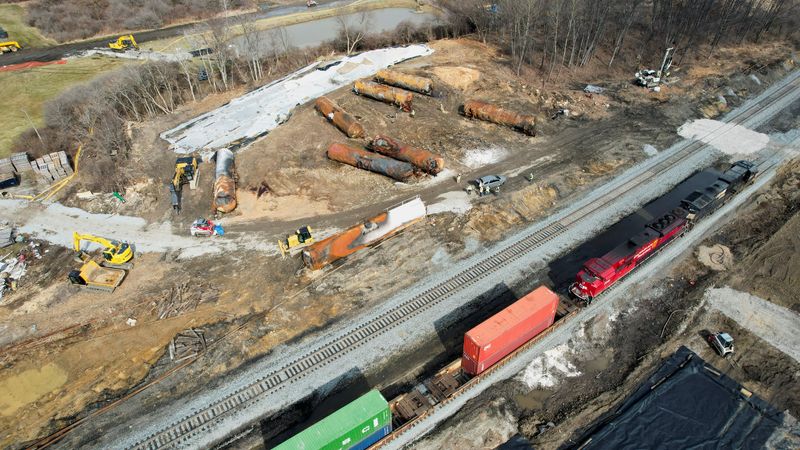By David Shepardson
WASHINGTON (Reuters) – The chairman of the National Transportation Safety Board said Norfolk South (NYSE:) threatened the board, tried to produce evidence and failed to provide documents during the investigation into a 2023 Ohio derailment.
NTSB Chairman Jennifer Homendy said in extraordinary remarks that the railroad “delayed or failed to provide critical investigative information to our team,” prompting her to twice warn that the agency would issue subpoenas to compel disclosure. She described the company’s actions as “unconscionable” and “reprehensible.”
The NTSB also found Tuesday that Norfolk Southern and its contractors were not required to vent and burn hazardous materials from tank cars after a February 2023 train derailment in East Palestine, Ohio, which it said was caused by a defective wheel bearing.
The derailment forced residents to temporarily evacuate their homes after the train caught fire and released more than 1 million gallons of hazardous materials and pollutants near the state line with Pennsylvania.
Norfolk Southern said in a statement that it cooperated “fully and ethically” with the NTSB investigation at all times, with full transparency.
“Our communications with NTSB staff and board members have always been motivated by a desire to ensure they had all relevant information for their independent review and by a shared commitment to promoting railroad safety,” the company said.
Last month, Norfolk Southern agreed to pay a $15 million civil penalty and $57.1 million in past government cleanup costs, as well as millions in future costs to resolve a U.S. government lawsuit.
Homendy cited a series of actions during the railroad’s investigation that she called unethical or inappropriate, including Norfolk Southern hiring a private company to conduct testing of ready-made vinyl chloride for inclusion in the NTSB record.
Parties are “not allowed to produce their own evidence and develop their own facts outside of the NTSB investigative process, which is exactly what Norfolk Southern did,” Homendy said.
She said that at NTSB meetings this month, a senior executive at Norfolk Southern urged the NTSB to “put to rest the ‘rumor’ that Norfolk Southern made the decision to ventilate and burn to move trains,” and called the railroad’s request “unethical and inappropriate.”
She added, “The whole exchange ended with what everyone from the NTSB heard in the room, it was a threat and it was conveyed that way.” She also said the railway company had invited the five board members to visit on Monday – the day before the meeting – and that this “would have been a breach of our ethical standards”.
‘DESIGNED EVIDENCE’
The NTSB said a major decision by Norfolk Southern and its contractors to seek approval from the unified incident commander to vent and burn hazardous materials from five tankers was unnecessary after they “misinterpreted and ignored evidence” and was an alternative option to let the cars cool down. was overlooked.
The NTSB staff also said Norfolk Southern and its contractors withheld “complete and accurate expert opinions and information.”
Norfolk Southern said the “sole motivation of the company and its contractors in recommending the vent and fire to Unified Command was the health and safety of the community and first responders,” adding that the decision was to “ensure the community from a potential catastrophic explosion.”
The company said the NTSB misstated the basis of the recommendation and rejected the claim that it withheld views from the incident commander. Last week, the railroad said it would convene a ventilation and fire working group to review current practices and existing protocols.
NTSB recommended that the Federal Railroad Administration adopt new safety requirements for inspections and maintenance of heat-bearing detectors, also known as box detectors or roadside detectors. The devices identify potential train safety issues by measuring temperatures as they pass.
The NTSB also wants the U.S. Department of Transportation to establish a replacement schedule to phase out the use of tank cars like some in the Ohio derailment and replace them with newer, safer tank cars with thicker tank walls and thermal protection.
CONSENT DECISION
Under a proposed consent decree estimated to be worth more than $310 million, the railroad also agreed to significant safety improvements and training, including installing additional devices to detect overheated wheel bearings early enough to prevent derailments. Norfolk Southern said it will spend $244 million on safety initiatives through 2025 under the agreement.
The incident sparked public outrage and calls for rail safety reforms in Congress, but legislation has stalled. Some lawmakers had said they wanted to wait for the NTSB’s report before taking action on safety.

Norfolk Southern, which admitted no wrongdoing, said last month that the deal means the company will face no criminal penalties and that the settlement is included in the roughly $1.7 billion in charges filed so far in the incident.
In April, Norfolk Southern agreed to pay $600 million to settle a class action lawsuit over the derailment. The settlement covers personal injury claims from residents and businesses in the city and affected surrounding communities.


